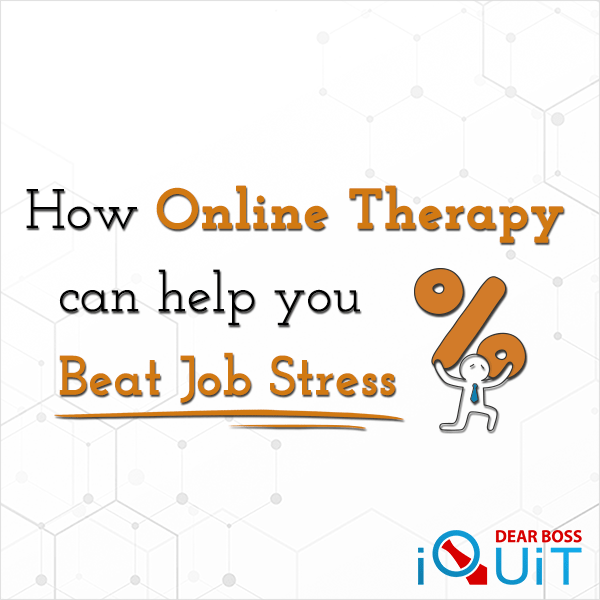*This post is sponsored by betterhelp.com
Nowadays, job-induced stress has become so common, that finding a working person who’s completely free of it, would be harder than looking for a needle in the haystack…
As a matter of fact, a report published by the American Psychological Association revealed that work was considered a significant source of stress for over 58% of employees.
Long-term work stress not only hinders your productivity and performance but could also cause a plethora of mental and/or physical health issues.
That being said, chronic job stress is an issue that shouldn’t be taken lightly, but rather dealt with as fast as possible.
That’s exactly why, in this article, I’m going to explore work-related stress in more detail, reveal some of its signs, causes, and effects, as well as discuss whether online therapy could help you beat it.
What Is Work-Related Stress?
Work-related stress is the stress that takes place as a result of consistent and long-term pressure caused by one or more aspects of a job, like excessive workload, unrealistic deadlines, lack of support, and conflict with co-workers…
Stress is a normal response of our nervous system that’s meant to better equip the body for defensive action against potential threats by releasing a mix of hormones that sharpen the senses, quicken the pulse, deepen respiration, and tense the muscles.
When infrequent and short-lived, stress poses little to no risk to our health and well-being.
On the contrary, becoming stressed for short periods of time, such as while trying to meet a deadline or resolve an unpredicted hiccup could actually boost your productivity and performance.
However, when stress takes place for long periods of time and on an ongoing basis, it could wear down our body and mind, thus compromising their ability to properly repair and defend themselves.
Ultimately, this could give rise to a plethora of physical, psychological, and behavioral issues.
That being said, if you can’t remember when was the last time that you weren’t stressed by your job then you need to act immediately before your health and well-being end up seriously damaged.
Signs of Job-Related Stress
While the reaction to work-related stress might differ from person to person, there are some symptoms that are pretty common among most sufferers, such as:
- Frequent headaches
- Insomnia
- Low-quality sleep
- Depression
- Fatigue
- Brain fog
- Mood swings
- Social distancing
- Irritability & aggression
- Low self-esteem
- Lack of confidence
- Reduced productivity
- Digestive disorders
- Regular colds and infections
- Heart palpitations
- Back and/or chest pains
- Disrupted appetite
- Nausea, constipation, and/or diarrhea
Lastly, in May 2019, the World Health Organization stated that burnout is tightly linked to long-term unmanaged workplace stress.
Causes of Job-Related Stress
Job stress can originate from a number of unfavorable work-related situations, including:
- Heavy workload
- Long shifts
- Too much overtime
- Unrealistic deadlines & expectations
- Infrequent breaks
- Micromanagement
- Jon insecurity
- Poor work environment
- Conflicts with colleagues
- Lack of autonomy
- Poor management
- Harassment
- Discrimination
- Boring duties
- Lack of resources & equipment
- No opportunities for advancement
- Feeling undervalued and/or underpaid
- & more
In general, the employees that are the most likely to experience work-related stress are those whose work consists of excessive demands that don’t match their knowledge and abilities, have little to no control over their work, and receive no support from their colleagues or managers.
Online Therapy for Work-Related Stress
Online therapy, or online counseling, is a form of psychotherapy (also known as talk therapy) with licensed mental health professionals, that takes place remotely via phone, webcam, email, and/or text message.
The origins of online counseling go back more than 20 years when the military started utilizing it to treat veterans that lived in rural areas.
Since then, the number of people who turn their attention to online therapy in an attempt to successfully beat their work-related stress has skyrocketed.
That’s probably because over the years, most people, especially millennials, have become naturally drawn to digital apps and services so communicating, opening up, and sharing personal information over online channels might make them feel much more comfortable than talking to someone face-to-face.
Some other significant benefits of online therapy include:
- Available all around the clock
- No stressful and time-consuming commute
- Being in your environment will make you feel more comfortable
- Connect with therapists from all around the world
- Easier to open up and share personal information
- Potential support between sessions
- More affordable & cost-effective than traditional in-person counseling
- Perfect for those in rural/remote areas
Online Therapy is the new frontier in mental health counseling. It’s amazing how it’s caught on: It’s private. It’s convenient. It’s comfortable for both the therapist and client. And it eliminates the stress of traffic and time. – Goali Saedi Bocci
On top of all the benefits it offers, many studies have revealed that online therapy can be as effective as face-to-face therapy.
Conclusion
Nowadays, for most, the concept of separation between work and free time doesn’t exist…
As a matter of fact, a study conducted by the Anxiety and Depression Association of America revealed that up to 83% of all employees claimed that work stress has spilled over and disrupted the quality of many aspects of their personal life.
Keeping job-related stress contained exclusively within the work shift is nearly impossible.
However, with the right help, it could be regulated.
That being said, if your job causes you more stress than you can handle, then I strongly suggest that you give online therapy a try.



2 Responses
Thank you, bro. Good information!
I’m glad you found that helpful 🙂
All the best,
Harry